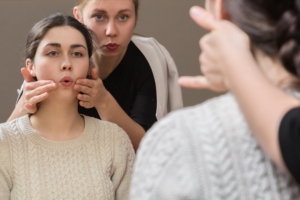
OakMed Speech and Recreational Therapists work closely with patients on communication, physical health, mental health and well-being.
Speech Therapy
Speech therapy, also known as speech-language therapy or speech-language pathology, is focused on diagnosing and treating communication and swallowing disorders. Speech therapists, formally known as speech-language pathologists (SLPs), work with individuals to help them improve their ability to communicate effectively and to address difficulties related to speech, language, voice, fluency, and swallowing. The speech therapist will consult with your physician and family on the communication needs and methods in which they can assist through therapy.
Speech therapy is important for improving overall communication and quality of life, as effective communication is essential for social interaction, education, and professional success. Speech therapists collaborate with other healthcare professionals, such as doctors and occupational therapists, to provide comprehensive care for individuals with communication and swallowing disorders. The specific treatment and duration of therapy can vary widely depending on the individual’s needs and the nature of their condition.
Speech Therapy can Help you Improve Your:
- Ability to use your voice.
- Language comprehension (how well you understand words and language).
- Fluency (how well and how comfortably you can use language).
- Clarity and expression (how easily you can communicate what you want to).
What Activities are Done in Speech Therapy?
Speech therapy is usually focused on improving or rebuilding particular skill sets like strengthening coordination between your brain and mouth. Some examples of speech therapy activities include:
- Tongue and mouth exercises: Your speech therapist will show you exercises and motions that will strengthen your mouth and tongue. These exercises help train your tongue to move in coordinated patterns.
- Facial movements: Controlling the expression on your face can help improve your motor skills. Your therapist might have you smile or pucker your lips, then relax your face.
- Reading out loud: If your speech disorder prevents you from moving your mouth and tongue properly, reading out loud can strengthen the connection between your brain and mouth.
- Playing word games: Studies have shown that memory games, word searches and crossword puzzles can maintain cognitive function and improve thinking skills.
Recreational Therapy
Recreational therapy, also known as therapeutic recreation, is a healthcare discipline that uses recreational and leisure activities as a means to improve the physical, mental, emotional, and social well-being of individuals with various disabilities, illnesses, or other healthcare conditions. The goal of recreational therapy is to enhance the overall quality of life, improve functional abilities, and promote independence and inclusion for patients or clients.
Recreational therapy can benefit people of all ages, including adults and older adults, and it is often used in a wide range of conditions, such as spinal cord injuries, stroke, mental health disorders, traumatic brain injuries, and developmental disabilities, among others. The activities used in recreational therapy are chosen to align with the client’s needs and interests, making it a patient-centered approach to healthcare.
A recreational therapist focuses on your interests to come up with a plan for treatment. They plan activities that will help you develop skills and behaviors to improve your quality of life. They can help you reach your:
- Functional goals.
- Physical goals.
- Emotional goals.
- Social goals.
- Psychological goals.
- Cognitive goals.
